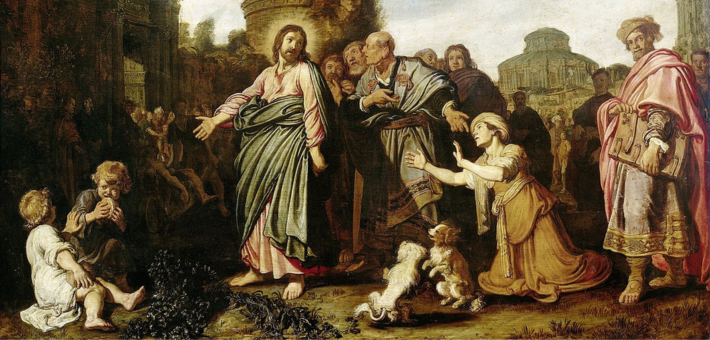Commentary on Psalm 146
Talk of politics and government are in the air these days. They are even in the lectionary.
As the U.S. approaches a presidential election, many of us are wondering how we can achieve a just, secure, and prosperous society. Who can take us there? What sort of leader do we need to realize this vision for our land? These questions are not unique to our own time. Long before American-style representative democracy, people were thinking about what good government looks like and how leaders can create just societies. In fact, Israel’s prayers in the Psalms reflect an intense concern with the issue of creating and sustaining just societies.
The psalms and politics: The royal psalms
So what is the biblical witness? What does the Bible say about right governance? A group of psalms called the “royal psalms” provide a witness to what a just government looks like in the context of the ancient Near East (Psalms 2, 18, 20, 21, 45, 72, 89, 101, 110, 132, 144, though there is some argument about which psalms belong in this category). In short, the royal psalms envision a king, divinely appointed and authorized, whose responsibility is to secure justice within the land. Some of these royal psalms present the actual words of the king in prayer. We find him pledging to rule with integrity, pledging to maintain his own righteousness, and claiming he will administer the government so as to foster righteousness throughout the land (for example, Psalms 2 and 101).
In this context, righteousness means that the poor are cared for, unjust systems are rooted out, the oppressed have an advocate in the highest office. The king stands ready to take up the cause of the poor, especially when the wealthy and powerful would seek to take advantage of them; the king guards the poor from oppression and abuse.
The royal psalms also include prayers for the king. These texts also show us what the king’s ideal governance looks like. In Psalm 72 we hear these words:
May he judge your people with righteousness,
and your poor with justice. (verse 2)
For [the king] delivers the needy when they call,
the poor and those who have no helper.
He has pity on the weak and the needy,
and saves the lives of the needy.
From oppression and violence he redeems their life. (verses 12–14a)
The psalms have a notion that this sort of righteousness in the highest office will yield prosperity broadly across the land. When justice and truth are the priorities of the government, the land will be fruitful and the economy will hum right along.
The psalms present a picture of a just king who is also strong—very strong—one who ensures security as well as righteousness and prosperity. The king enjoins the full power of the state to bring about justice for all those who suffer violence. Again, Psalm 72:
May he defend the cause of the poor of the people,
give deliverance to the needy, and crush the oppressor. (verse 4)
These oppressors may be internal, but more often in the psalms they are external, understood as foreign powers hostile to God’s people and purposes. Indeed, as much as we read about the king promoting justice within society, we read even more about the king as uniquely positioned to execute violence in the name of God for the protection of the people from external threats. In short, the royal psalms present a clear picture of a strong leader of a just government.
So, despite the difference in time and location, many of us concerned with issues of government and power might look at the psalms and recognize that we’re looking for roughly the same things in leaders: persons with integrity, compassion, and strength to bring about a righteous society. In fact, this vision of leadership resonates broadly across the modern American political spectrum.
The psalms and politics: The hallelujah psalms
This discussion of royal psalms is important background for understanding the lectionary text of Psalm 146, which is the first of another group of psalms, the five that conclude the Psalter. These are sometimes called the “hallelujah psalms,” because each begins and ends with the Hebrew phrase hallelu-yah. Grammatically speaking, this is a command, an imperative statement addressed to a community that we can translate “All y’all must praise!” Who gets the praise? Yah, a shortened form of the divine name. Halleluyah means “Hey, everyone, praise Yahweh.” Praise the Lord.
The hallelujah psalms can be interpreted as a reframing of the royal psalms and their notion of a king’s just governance. Coming as they do at the end of the Psalter, the hallelujah psalms put the royal psalms in a whole new light. In their constant calls to praise Yahweh, these psalms upend and replace any confidence one may have in any earthly king. Instead, we find here the exaltation of Yahweh alone. The Psalter concludes with the celebration of the sole kingship of Yahweh, which stands over and against all other sources of authority in the world. No king, no human, nothing on earth or in the heavens can compare with God’s glory and power. At the end of the Psalter, all creation is called to praise Yahweh, the true and only king (Psalm 150).
In Psalm 146, the introduction to these final hallelujah psalms, Yahweh assumes the throne. Yahweh personally takes on all the duties of just leadership. All the kingly actions mentioned in the royal psalms become the actions of Yahweh. In verses 7–9 we read that
- Yahweh executes justice for the oppressed.
- Yahweh gives food to the hungry.
- Yahweh sets the prisoners free.
- Yahweh opens the eyes of the blind.
- Yahweh lifts up those who are bowed down.
- Yahweh loves the righteous.
- Yahweh watches over the aliens.
- Yahweh upholds the orphans and the widows.
- But Yahweh brings the way of the wicked to ruin.
The justice that was the king’s domain now belongs to Yahweh. Yahweh takes total responsibility here at the end of the Psalter. The psalm is insistent. It repeats its claim over and over: It’s Yahweh who does this kingly stuff. It’s Yahweh. It’s Yahweh alone. So, all y’all, praise Yahweh.
And it makes a further claim, in verses 3–4: Do not trust in princes. Don’t rely on them. Don’t lean on them. Nor should one trust a mortal (in Hebrew, ben-adam; literally, “a son of man”). There is no help in him. “Help” here in Hebrew is the word teshua. This is the word often translated “salvation” elsewhere in the Old Testament. This is “big-time” help, salvation from peril. And there is no salvation in a prince, nor a mortal.
The Hebrew syntax in verse 3 is wonderfully ambiguous. It could be read that there is no salvation coming from that mortal. It can also be read that there is no salvation coming for that mortal. The psalm claims that those princes, those most noble and celebrated in the land, have nothing at all to do with salvation, so don’t rely on them. They’re not getting saved, and they can’t save you. Instead, “Praise Yahweh,” argues Psalm 146. Yahweh alone reigns. Yahweh is the true leader and the one who administers a just government.
Political analogies and Psalm 146
What effect does a psalm like this have on those who sing it and pray it?
First of all, as we sing this song over and over again, we are disabused of our notion that any leader can inspire our ultimate trust. Our trust should remain in Yahweh alone. All other allegiances, all partisanship, all cults of personality—be they political, religious, or even academic—dissolve in light of this psalm. This is actually a difficult and painful realization. We are drawn to these “princes” or “princesses,” as the case may be. We clamor for their inspiring leadership, for all they stand for and all they have done, and for the way they can stir us with their words.
Yet the psalm says “No!” Yahweh alone emerges as the one who acts. And Yahweh acts in particular ways for particular people. Yahweh acts for the poor, the hungry, the prisoner, the oppressed, those who have no advocate, those outside the structures of power, the alien, those bowed down. These are Yahweh’s people. Yahweh doesn’t act on behalf of the princes. There is no salvation in any way associated with them. Princes don’t receive salvation, and they don’t give it either.
When we praise Yahweh, when we pray this psalm over and over, when we sing it, when we meditate on it, we as Yahweh’s people who praise find ourselves bound to Yahweh’s people who suffer, to those who are bowed down. When we come across the widow and the orphan, the oppressed, we recognize them from our songs. We realize: Hey, these are Yahweh’s people, and we are Yahweh’s people. We are wrapped up with these people through Yahweh. And if we are the oppressed, we can take hope that Yahweh’s mission is to bring justice for us.
When we truly praise Yahweh as king, that worship leads us necessarily to action on behalf of those for whom Yahweh acts. Our prayers, our songs of praise shape us. As we praise, we are inclined to seek justice and advocate for the poor. As we praise, the God we worship is shaping our politics.
Our worship of Yahweh as king inexorably draws us into politics, into the life of the community. Yet as we praise God, we also continually affirm that our trust is never in politics, never in politicians, in these princes of this world. We do not trust a prince, nor a mortal in whom there is no salvation.
A Christian approach to psalms and politics
When Christians praise Yahweh as king, the Holy Spirit reminds us there is a prince in whom we can trust, one in whom there is salvation. We have a Prince of Peace, the Son of Man, a faithful witness to God’s work of justice in the world. In our praise, we realize we are God’s people and that, as God’s people, we serve God’s suffering people. For as we praise, God is shaping us, shaping our actions, even shaping our politics. And because of our praise, we must act for God’s people, for those who are bowed down.
The power of the Holy Spirit orders us through our worship. Praising the King of kings teaches us how our actions can reflect God’s will and how we might realize God’s righteousness in our land.


September 8, 2024